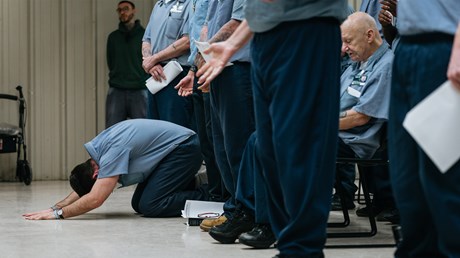Why Prison Ministries Are Growing
Adaptations for COVID-19 are helping Christians reach incarcerated people, with eager cooperation from government officials.

To reach the chapel at the Chillicothe Correctional Institution in rural southeast Ohio, volunteers from the worship team at Rock City Church navigate a maze of checkpoints.
First, they sign in and show identification. One state prison official stamps their hands with invisible ink before another inspects the marks with a black light. Then they lug their instrument cases, amps, and coils of thick black cables behind an escort through a series of huge iron doors that beep like a game show buzzer before letting them in.
Rock City, a nondenominational megachurch based in Columbus, Ohio, started hosting worship nights at Chillicothe during the pandemic. Unable to come inside, they’d set up their equipment outside the prison fence and sing from the grass.
Prison officials eventually contacted Rock City pastor Chad Fisher—not to complain, but to ask for more. They noticed the music was having a positive impact on those incarcerated.
Rock City has run a prison ministry for years but had struggled to win over hesitant officials in several state facilities. That changed with the pandemic.
“We started getting calls left and right from prisons,” Fisher remembers of early 2020. “They were saying … ‘If you’re willing to give us your weekend service, worship, and message, we will show it to our entire population within the walls.’ ”
Rock City now sends footage of its Sunday service to 17 state and federal prisons around Ohio, along with a regular team of volunteers who worship alongside the incarcerated people. Most weeks, Fisher begins his sermon by welcoming those watching online, including “those watching from a prison cell.”
It’s not every day the government …
